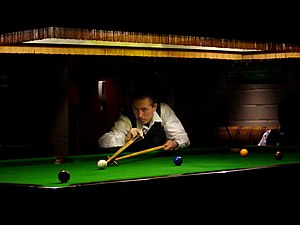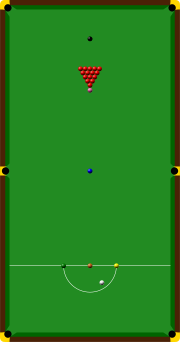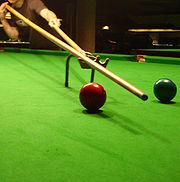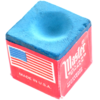Snooker
 Snooker player playing a shot with a rest |
|
| Highest governing body | World Snooker Association |
|---|---|
| First played | 19th century |
| Characteristics | |
| Category | Cue sport |
| Ball | snooker balls |
| Olympic | No |
Snooker is a cue sport that is played on a large baize-covered table with pockets in each of the four corners and in the middle of each of the long side cushions. A regulation (full-size) table is 12 ft × 6 ft (3.6 m x 1.8 m). It is played using a cue and snooker balls: one white cue ball, 15 red balls worth one point each, and six balls of different colours yellow (2 points), green (3), brown (4), blue (5), pink (6) and black (7).[1] A player (or team) wins a frame (individual game) of snooker by scoring more points than the opponent(s), using the cue ball to pot the red and coloured balls. A player wins a match when a certain number of frames have been won.
Snooker is particularly popular in many of the English-speaking and Commonwealth countries,[2] and in China,[3][4] with the top professional players attaining multi-million pound career earnings from the game.[5]
Contents[hide] |
[edit] History
The game is generally regarded to have originated in the latter half of the 19th century.[6] Billiards had been a popular activity amongst British Army officers stationed in India, and variations on the more traditional billiard games were devised. One variation, devised in the officers' mess in Jabalpur during 1874[7] or 1875,[6] was to add coloured balls in addition to the reds and black which were used for pyramid pool and life pool.[8] The word snooker also has military origins, being a slang term for first-year cadets or inexperienced personnel.[6] One version of events states that Colonel Sir Neville Chamberlain of the Devonshire regiment was playing this new game when his opponent failed to pot a ball and Chamberlain called him a snooker.[8] It thus became attached to the billiards game now bearing its name as inexperienced players were labelled as snookers.[9]
The game of snooker grew in the latter half of the 19th century and the early 20th century, and by 1927 the first World Snooker Championship[6] had been organised by Joe Davis who, as a professional English billiards and snooker player, moved the game from a pastime activity into a more professional sphere.[10] Joe Davis won every world championship until 1946 when he retired. The game went into a decline through the 1950s and 1960s with little interest generated outside of those who played. Things saw some improvement when in 1969, when David Attenborough who was then a top official of the BBC, commissioned the snooker tournament Pot Black to demonstrate the potential of colour television, with the green table and multi-coloured balls being ideal for showing off the advantages of colour broadcasting.[11][4] The TV series became a ratings success and was for a time the second most popular show on BBC Two.[12] Interest in the game increased and the 1978 World Championship was the first to be fully televised.[13] [2] The game quickly became a mainstream sport[14] in the UK, Ireland and much of the Commonwealth and has enjoyed much success in the last 30 years, with most of the ranking tournaments being televised. In 1985 a total of 18.5 million viewers watched the concluding frame of the world championship final between Dennis Taylor and Steve Davis.[15] In recent years the loss of tobacco sponsorship has led to a decrease in the number of professional tournaments, although some new sponsors have been sourced;[16] and the popularity of the game in the Far East and China, with emerging talents such as Liang Wenbo and more established players such as Ding Junhui and Marco Fu, bodes well for the future of the sport in that part of the world.[17][18]
[edit] The game

The object of the game is to score more points than the opponent by potting object balls in a predefined order. At the start of a frame, the balls are positioned as shown and the players take it in turns to hit a shot in a single strike from the tip of the cue, their aim being to pot one of the red balls and score a point. If they do pot at least one red, then it remains in the pocket and they are allowed another shot - this time the aim being to pot one of the colours. If successful, then they gain the value of the colour potted. It is returned to its correct position on the table and they must try to pot another red again. This process continues until they fail to pot the desired ball, at which point their opponent comes back to the table to play the next shot. The game continues in this manner until all the reds are potted and only the 6 colours are left on the table; at that point the aim is then to pot the colours in the order yellow, green, brown, blue, pink, black. When a colour is potted in this phase of a frame, it remains off the table. When the final ball is potted, the player with the most points wins.[1]
Points may also be scored in a game when a player's opponent fouls. A foul can occur for numerous reasons, such as hitting a colour first when the player was attempting to hit a red, potting the cue ball, or failing to escape from "a snooker" (a situation where the previous player finished their turn leaving the cue ball in a position where the object ball cannot be hit directly). Points gained from a foul vary from a minimum of 4 to a maximum of 7 if the black ball is involved.[1]
One game, from the balls in their starting position until the last ball is potted, is called a frame. A match generally consists of a predefined number of frames and the player who wins the most frames wins the match overall. Most professional matches require a player to win five frames, and are called 'Best of Nine' as that is the maximum possible number of frames. Tournament finals are usually best of 17 or best of 19, while the World Championship uses longer matches - ranging from best of 19 in the qualifiers and the first round proper, up to 35 frames in length (first to 18), and is played over two days.[19]
Professional and competitive amateur matches are officiated by a referee who is the sole judge of fair play. Professional players usually play the game in a fair manner, declaring that they have played a foul shot if the referee misses it, acknowledging good shots from their opponent, or holding up a hand to apologise for fortunate shots.
Other terminology used in snooker includes a player's break, which refers to the total number of consecutive points a player has amassed (excluding fouls) when at one visit to the table. A player attaining a break of 15, for example, could have reached it by potting a red then a black, then a red then a pink, before failing to pot the next red. The traditional maximum break in snooker is to pot all reds with blacks then all colours, which would yield 147 points; this is often known as a "147" or a "maximum".[20] See also: Highest snooker breaks.
Accessories used for snooker include chalk for the tip of the cue, rests of various sorts (needed often, due to the length of a full-size table), a triangle to rack the reds, and a scoreboard. One drawback of snooker on a full-size table is the size of the room (22' x 16' or approximately 5 m x 7 m), which is the minimum required for comfortable cueing room on all sides.[21] This limits the number of locations in which the game can easily be played. While pool tables are common to many pubs, snooker tends to be played either in private surroundings or in public snooker halls. The game can also be played on smaller tables using fewer red balls. The variants in table size are: 10' x 5', 9' x 4.5', 8' x 4', 6' x 3' (the smallest for realistic play) and 4' x 2'. Smaller tables can come in a variety of styles, such as fold away or dining-table convertible.
[edit] Governance and tournaments

 Snooker tournaments |
| Ranking tournaments |
| World Championship |
| UK Championship |
| Grand Prix |
| Welsh Open |
| China Open |
| Shanghai Masters |
| Northern Ireland Trophy |
| Bahrain Championship |
| Other tournaments |
| Masters |
| Premier League |
| Pot Black |
| Jiangsu Classic |
| World Series of Snooker |
| Withdrawn tournaments |
| See: Snooker tournaments |
The World Professional Billiards and Snooker Association (WPBSA, also known as World Snooker), founded in 1968 as the Professional Billiard Players' Association,[22] is the governing body for the professional game. Its subsidiary, World Snooker, based in Bristol, England, organises the professional tour. Over the years the board of the WPBSA has changed many times, which some argue is an indication of in-fighting within the sport.[23] [24] [25] The amateur game is governed by the International Billiards and Snooker Federation (IBSF).[26]
Professional snooker players can play on the World Snooker main tour ranking circuit. Ranking points, earned by players through their performances over the previous two seasons, determine the current world ranking.[27] A player's ranking determines what level of qualification they require for ranking tournaments. The elite of professional snooker is generally regarded at the "Top 16" ranking players,[28] who are not required to pre-qualify for any of the tournaments.[29] The tour contains 96 players - the top 64 from the previous two seasons, the 8 highest one-year point scorers who are not in the top 64, the top 8 from the previous season's Challenge Tour, and various regional, junior and amateur champions.
The most important event in professional snooker is the World Championship,[30] held annually since 1927 (except during the Second World War and between 1958 and 1963). The tournament has been held at the Crucible Theatre in Sheffield (England) since 1977, and was sponsored by Embassy from 1976 to 2005.[16] Since 2005, tobacco companies have not been allowed to sponsor sporting events in the United Kingdom, and the World Snooker Championship had to find a new sponsor. It was announced in January 2006 that the 2006–2010 world championships would be sponsored by online casino 888.com [31]. The status of winning the World Championship is great, and it is the most highly valued prize in professional snooker,[32] both in terms of financial reward (£250,000 for the winner)[33] as well as prestige. The World Championship is televised extensively in the UK by the BBC[34] and gains significant coverage in Europe on Eurosport[35] and in the Far East.
The group of tournaments that come next in importance are the other ranking tournaments. Players in these tournaments score world ranking points. A high ranking ensures qualification for next year's tournaments, invitations to invitational tournaments and an advantageous draw in tournaments.[28]. The most prestigious of these after the World Championship is the UK Championship. Third in line are the invitational tournaments, to which most of the highest ranked players are invited. The most important tournament in this category is The Masters,[36] which to most players is the second or third most sought-after prize.[37]
In an attempt to answer criticisms that televised matches can be slow or get bogged down in lengthy safety exchanges and that long matches causes problems for advertisers,[38] an alternative series of timed tournaments has been organised by Matchroom Sport Chairman Barry Hearn. The shot-timed Betfred Premier League was established, with the top eight players in the world invited to compete at regular United Kingdom venues, televised on Sky Sports. Players have twenty-five seconds to take each shot, with a small number of time-outs per player. While some success has been achieved with this format it generally does not receive the same amount of press attention or status as the regular ranking tournaments.
There are also other tournaments that have less importance, earn no world ranking points and are not televised. These can change on a year-to-year basis depending on calendars and sponsors. Currently the Pontin’s International Open Series[39] is organised as one of these additional tournament series by World Snooker.
[edit] List of snooker equipment
- Chalk
- The tip of the cue is 'chalked' to ensure good contact between the cue and the cue-ball.
- Cue
- A stick, made of wood or fibreglass, the tip of which is used to strike the cue-ball.
- Extension
- A shorter baton that fits over, or screws into, the back end of the cue, effectively lengthening it. Is used for shots where the cue-ball is a long distance from the player.
- Rest
- A stick with an X-shaped head that is used to support the cue when the cue ball is out of reach at normal extension.
- Hook rest
- Identical to the normal rest, yet with a hooked metal end. It is used to set the rest around another ball. The hook rest is the most recent invention in snooker.
- Spider
- Similar to the rest but with an arch-shaped head; it is used to elevate and support the tip of the cue above the height of the cue-ball.
- Swan (or swan-neck spider)
- This equipment, consisting of a rest with a single extended neck and a fork-like prong at the end, is used to give extra cueing distance over a group of balls.
- Triangle/Rack
- The piece of equipment is used for gathering the red balls into the formation required for the break to start a frame.
- Extended rest
- Similar to the regular rest, but with a mechanism at the butt end which makes it possible to extend the rest by up to three feet.
- Extended spider
- A hybrid of the swan and the spider. Its purpose is to bridge over large packs of reds. Is less common these days in professional snooker but can be used in situations where the position of one or more balls prevents the spider being placed where the striker desires.
- Ball marker
- A multi-purpose instrument with a 'D' shaped notch, which a referee can (1) place next to a ball, in order to mark the position of it. He can then remove the ball to clean it; (2) use to judge if a ball is preventing a colour from being placed on its spot; (3) use to judge if the cue ball can hit the extreme edge of a "ball on" when awarding a free ball (by placing it alongside the potentially intervening ball).
[edit] Notable players
In the professional era that began with Joe Davis in the 1930s and continues up until the present day, a relatively small number of players have succeeded at the top level.[40] Reaching and maintaining a place amongst the snooker elite is a tough task, with the standards of the game being such that it requires many years of dedication and effort as well as natural ability.[41]
Certain players have tended to dominate the sport through the decades. Ray Reardon is generally regarded as the principal player through the 1970s, Steve Davis through the 1980s and Stephen Hendry through the 1990s, winning 6, 6 and 7 World Championships respectively. In the 2000s no one has dominated, with Ronnie O'Sullivan winning the title on three occasions and John Higgins and Mark Williams both winning twice.[42]
Currently, the provisional ranking for 2008:[43]
- Ronnie O'Sullivan
- Stephen Maguire
- Shaun Murphy
- Mark Selby
- Allister Carter
- Ryan Day
- Joe Perry
- Marco Fu
- John Higgins
- Stephen Hendry
- Mark Allen
- Mark J. Williams
- Ding Junhui
- Dave Harold
- Peter Ebdon
- Barry Hawkins
[edit] Variants
- Snooker plus, a variant with additional balls
- Sinuca Brasileira, a Brazilian version with only one red ball, and divergent rules
- Volunteer Snooker, a variant from the early 1900s.
[edit] See also
- 2008-2009 Snooker Season
- Snooker lists
- Snooker rules
- Highest snooker break
- Snooker world rankings 2008/2009
- Snooker league
[edit] References
- ^ a b c "The Rules". World Snooker. Retrieved on 2008-01-05.
- ^ a b Everton, C. "Take snooker to the world", BBC Sport, 5 May 2002, (Retrieved 24 February 2007)
- ^ Harris, N. "Snooker: China's big break", The Independent, 21 March 2006, (Retrieved 24 February 2007)
- ^ a b Porter, H. "Cue China, Time Magazine, 20 June 2008, (Retrieved 23 June 2008)
- ^ Reardon, R. "Where does Ronnie rank?", BBC Sport, 21 February 2005, (Retrieved 25 February 2007)
- ^ a b c d Maume, C."Sporting Vernacular 11. Snooker", The Independent, 26 April 1999, (Retrieved 25 February 2007)
- ^ Bedi, R. "Opening meet finds India's only hunt in the pink", The Telegraph, 19 July 2004, (Retrieved 25 February 2007)
- ^ a b Shamos, Mike (1993), The Complete Book of Billiards. ISBN 0-517-20869-5
- ^ unknown author "Origins of the Game of Snooker", Titan Sports, unknown date, (Retrieved 25 February 2007), (Archive Version)
- ^ unknown author "Snooker Timeline" "Joe Davis will reinvent this after-dinner pastime and become world champion", cuesnviews.co.uk, unknown date, (Retrieved 24 February 2007), (Archive Version)
- ^ "Pot Black returns", BBC Sport, 27 October 2005, Retrieved 24 February 2007
- ^ unknown author, "Pot Black Ratings" "Surprisingly, the programme raced to second place in the BBC2 ratings", unknown date, (Retrieved 24 February 2007) (Archive Version)
- ^ unknown author "1978 - The World Snooker Championships", "By 1977, though, a new lighting system had been devised, allowing the players to be seen clearly without problems and, the following year, Aubrey Singer agreed to cover the World Championships all the way through, with an hour of highlights every day for 16 days", unknown date, (Retrieved 24 February 2007), (Archive Version)
- ^ MacInnes, P."Thatch of the day", The Guardian, 10 February 2004, (Retrieved 24 February 2007)
- ^ "1985: the black ball final" BBC sport
- ^ a b Anstead, M."Snooker finds sponsor with deep pockets", The Guardian, 19 January 2006, (Retrieved 24 February 2007), (Archive Version)
- ^ "Could Ding be snooker's saviour?", BBC Sport, 4 April 2005, (Retrieved 25 February 2007)
- ^ "China in Ding's hands", BBC Sport, 22 January 2007, (Retrieved 25 February 2007)
- ^ "World title victory delights Dott", BBC Sport, (Retrieved 24 February 2007)
- ^ "Ding compiles maximum at Masters", BBC Sport, (Retrieved 24 February 2007)
- ^ Peter Ietswaart, "Thurston Snooker Table makers", Recommended room size for full size table 22 ft x 16 ft, unknown date, (Retrieved 25 February 2007), (Archive Version)
- ^ "WPBSA v TSN", BBC Sport, 16 February 2001, (Retrieved 25 February 2007), (Archive Version)
- ^ "Snooker's biggest break", BBC Sport, 7 December 2000, (Retrieved 25 February 2007), (Archive Version)
- ^ "Snooker authorities survive bid", BBC Sport, 13 November 2002, (Retrieved 25 February 2007), (Archive Version)
- ^ "Snooker at the crossroads", BBC Sport, 14 November 2002, (Retrieved 25 February 2007), (Archive Version)
- ^ "IBSF", (Retrieved 24 February 2007), (Archive Version)
- ^ WPBSA "Professional Tour ranking points", World Snooker, (Retrieved 24 February 2007)
- ^ a b "Swail targeting place in top 16", BBC Sport, 1 August 2006, (Retrieved 25 February 2007)
- ^ "The Seeds of Success", BBC Sport, 24 November 2000, (Retrieved 25 February 2007), (Archive Version)
- ^ "World title victory delights Dott", BBC Sport, 2 May 2006, (Retrieved 25 February 2007)
- ^ "Crucible event gets new sponsor", BBC Sport, 15 January 2006, (Retrieved 25 February 2007), (Archive Version)
- ^ "Doherty sets out to regain greatest prize", The Independent, 20 April 2001, (Retrieved 25 February 2007)
- ^ "World's best ready for Crucible", BBC Sport, 13 April 2006, (Retrieved 25 February 2007), (Archive Version)
- ^ "Snooker signs five-year BBC deal", BBC Sport, 26 October 2005, (Retrieved 25 February 2007, (Archive Version)
- ^ "Eurosport pots TV snooker rights", The Guardian, 27 April 2006, (Retrieved 25 February 2007, registration or BugMeNot required)
- ^ "Snooker finds new Masters sponsor", BBC Sport, 13 January 2006, (Retrieved 25 February 2007, (Archive Version)
- ^ Harris, N. "An email conversation with Graeme Dott: 'We need an Abramovich to take the game to a new level", The Independent, 15 January 2007, (Retrieved 25 February 2007)
- ^ Ronay, B. "Too dull to miss", The Guardian, 27 October 2006, (Retrieved 25 February 2007)
- ^ WPBSA, "Pontins International Open Series", World Snooker, (Retrieved 24 February 2007)
- ^ "O'Sullivan in exalted company", BBC Sport, 10 May 2002, (Retrieved 25 February 2007), (Archive Version)
- ^ Hunter, P. "Putting in the practice", BBC Sport, 5 November 2004, (Retrieved 25 February 2007)
- ^ "World Snooker Championship - History", World Snooker Official Site, (Retrieved 26 September 2007)
- ^ 2008 World Snooker - Provisional rankings
[edit] External links
 |
Wikimedia Commons has media related to: Snooker |
 |
Look up Snooker in Wiktionary, the free dictionary. |
- World Snooker Association
- IBSF — International Billiards & Snooker Federation
- BetFred Premier League — snooker tournaments
|
||||||||||||||||
|
|
||












 Back to top
Back to top